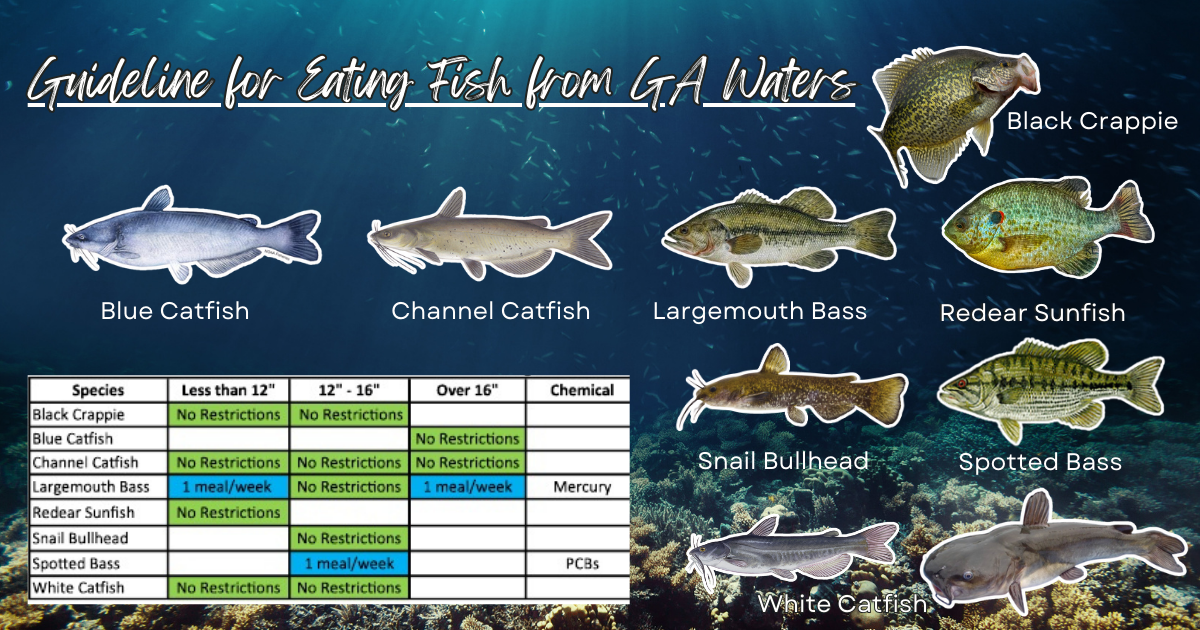Jackson Lake Water Quality and Guidelines for Fish Consumption

The purpose of this article is to provide information on the water quality in Jackson Lake and guidelines for consuming fish from the lake. We will discuss the current condition of the water in Jackson Lake and provide recommendations on the safe level of fish consumption. Please note that the information presented here is based on available data and research, and it is subject to change as new data becomes available. We advise you to regularly consult updated resources for the most accurate and current information.
Jackson Lake is one of the few lakes that undergo water testing, a practice not commonly seen elsewhere in Georgia. The process of testing is complex, and it doesn't involve ranking the waters as "good" or "clean." Information on water quality, including turbidity, conductivity, temperature, pH, oxygen levels, and clarity is submitted to the EPD by our volunteers through the Adopt a Stream program. However, understanding these readings can be challenging without knowledge of the specific parameters they relate to. According to the Environmental Protection Agency's (EPA) standards, the water we tested would be deemed safe for swimming. Should there be any detection of high levels of E. coli, we would make an immediate announcement. We aim for conducting monthly testing at six different locations, however, we do not test during periods of flooding.
If we judge water based on fish consumption, which is an essential indicator of water quality, the Environmental Protection Division (EPD) provides a Guideline for Eating Fish from GA Waters. This guideline covers various types of fish, advising on how much and what sizes are safe to eat, offering insights into water quality. See visual below. To answer the question about water quality, this is taken from page 2 of this report: “Are Georgia’s Fish Safe to Eat? Yes. The quality of fish in Georgia is good.” For information on fish tested and contaminants found, download the guide to read more.
Note: If you are pregnant or a nursing mother, or plan to become pregnant soon, you and children under 6 years of age are sensitive to the effects of contaminants such as mercury. DNR’s guidelines are designed to be protective for these sensitive groups. In early 2001 the USEPA issued a national advisory recommending that these sensitive groups limit consumption of all freshwater fish to one meal per week due to mercury. People may wish to follow USEPA’s recommendation, especially in areas where DNR has not tested fish and offered detailed guidelines. For most other healthy adults, DNR’s recommendations may actually be overly conservative.
Jackson Lake is one of the few lakes that undergo water testing, a practice not commonly seen elsewhere in Georgia. The process of testing is complex, and it doesn't involve ranking the waters as "good" or "clean." Information on water quality, including turbidity, conductivity, temperature, pH, oxygen levels, and clarity is submitted to the EPD by our volunteers through the Adopt a Stream program. However, understanding these readings can be challenging without knowledge of the specific parameters they relate to. According to the Environmental Protection Agency's (EPA) standards, the water we tested would be deemed safe for swimming. Should there be any detection of high levels of E. coli, we would make an immediate announcement. We aim for conducting monthly testing at six different locations, however, we do not test during periods of flooding.
If we judge water based on fish consumption, which is an essential indicator of water quality, the Environmental Protection Division (EPD) provides a Guideline for Eating Fish from GA Waters. This guideline covers various types of fish, advising on how much and what sizes are safe to eat, offering insights into water quality. See visual below. To answer the question about water quality, this is taken from page 2 of this report: “Are Georgia’s Fish Safe to Eat? Yes. The quality of fish in Georgia is good.” For information on fish tested and contaminants found, download the guide to read more.
Note: If you are pregnant or a nursing mother, or plan to become pregnant soon, you and children under 6 years of age are sensitive to the effects of contaminants such as mercury. DNR’s guidelines are designed to be protective for these sensitive groups. In early 2001 the USEPA issued a national advisory recommending that these sensitive groups limit consumption of all freshwater fish to one meal per week due to mercury. People may wish to follow USEPA’s recommendation, especially in areas where DNR has not tested fish and offered detailed guidelines. For most other healthy adults, DNR’s recommendations may actually be overly conservative.
